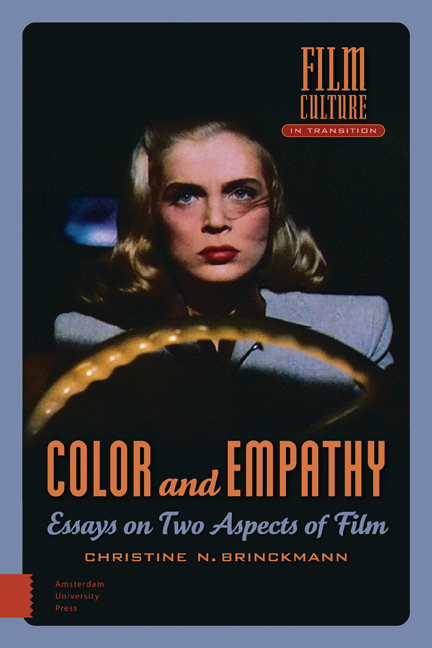Book contents
- Frontmatter
- Contents
- Preface
- Dedication
- Cinematic Color as Likeness and as Artifact: [2001]
- Chords of Color: [2006]
- The Tension of Colors in Colorized Silent Films: [2001]
- Structural Film, Structuring Color: Jenny Okun's Still Life: [1995]
- Desert Fury: A Film Noir in Color: [2012]
- The Work of the Camera: BEAU TRAVAIL: [2005]
- Empathy with the Animal: [1997]
- Motor Mimicry in Hitchcock: [1999]
- Abstraction and Empathy in the Early German Avant-garde: [1997]
- The Role of Empathy in Documentary Film: A Case Study: [2005]
- Genre Conflict in Tracey Emin’s Top Spot: [2007]
- Viewer Empathy and Mosaic Structure in Frederick Wiseman’s PRIMATE: [2009]
- CASTA DIVA: An Empathetic Reading: [2008]
- Publication Data
- Index of Films
- Index of Subjects
- Film Culture in Transition
CASTA DIVA: An Empathetic Reading: [2008]
Published online by Cambridge University Press: 23 June 2021
- Frontmatter
- Contents
- Preface
- Dedication
- Cinematic Color as Likeness and as Artifact: [2001]
- Chords of Color: [2006]
- The Tension of Colors in Colorized Silent Films: [2001]
- Structural Film, Structuring Color: Jenny Okun's Still Life: [1995]
- Desert Fury: A Film Noir in Color: [2012]
- The Work of the Camera: BEAU TRAVAIL: [2005]
- Empathy with the Animal: [1997]
- Motor Mimicry in Hitchcock: [1999]
- Abstraction and Empathy in the Early German Avant-garde: [1997]
- The Role of Empathy in Documentary Film: A Case Study: [2005]
- Genre Conflict in Tracey Emin’s Top Spot: [2007]
- Viewer Empathy and Mosaic Structure in Frederick Wiseman’s PRIMATE: [2009]
- CASTA DIVA: An Empathetic Reading: [2008]
- Publication Data
- Index of Films
- Index of Subjects
- Film Culture in Transition
Summary
CASTA DIVA is the first film by Belgian director, screenwriter, novelist, film theorist, and archivist Eric de Kuyper. Produced on a tiny budget and with the help of his friends – a work of cinéma copain – CASTA DIVA is now considered an original masterpiece of the queer avant-garde.
The film hardly fits into any conventional genre categories. Vaguely fictional at best, it is neither documentary nor lyrical, neither autobiographical nor an essay; rather, this is a show – consisting of episodes, like acts in vaudeville, or song-and-dance numbers in an American musical. There is no single main character, central conflict, or conclusive temporal order, and no diegetic dialogue. Instead, the music gives the individual numbers their particular mood and ironic tone. In a series of short sketches depicting everyday activities, the film displays a chain of motifs involving attractive young men posing in front of the camera or a mirror, washing, putting on or removing their clothes, waiting for or observing one another. CASTA DIVA, in rich black-and-white, was filmed in long sequence shots, as if it had been left up to the actors to play their roles spontaneously and according to their own ideas. At the same time, all their movements are perfectly choreographed, precisely matching the chosen framing.
The episode to be discussed here is at the film's beginning. Preceded by opening credits that, in addition to providing the obligatory information about the film crew, include pin-ups of the actors and a door that opens and closes, a projected beam of light and part of a soundtrack from early 1930s Hollywood: a self-reflective gesture toward the medium and an ironic introduction to the nature and theme of the film to follow.
The episode provides the film with its title. After a moment of silence, the aria “Casta Diva” from Vincenzo Bellini's 1831 opera Norma is introduced as the single acoustic element. We see an old building with a baroque balcony; a young man steps onto it, disappears, then reappears, changes clothes, lingers idly. The camera observes him from a house across the street, remaining fixed in place and recording the action in a single uninterrupted shot.
- Type
- Chapter
- Information
- Color and EmpathyEssays on Two Aspects of Film, pp. 241 - 258Publisher: Amsterdam University PressPrint publication year: 2014



